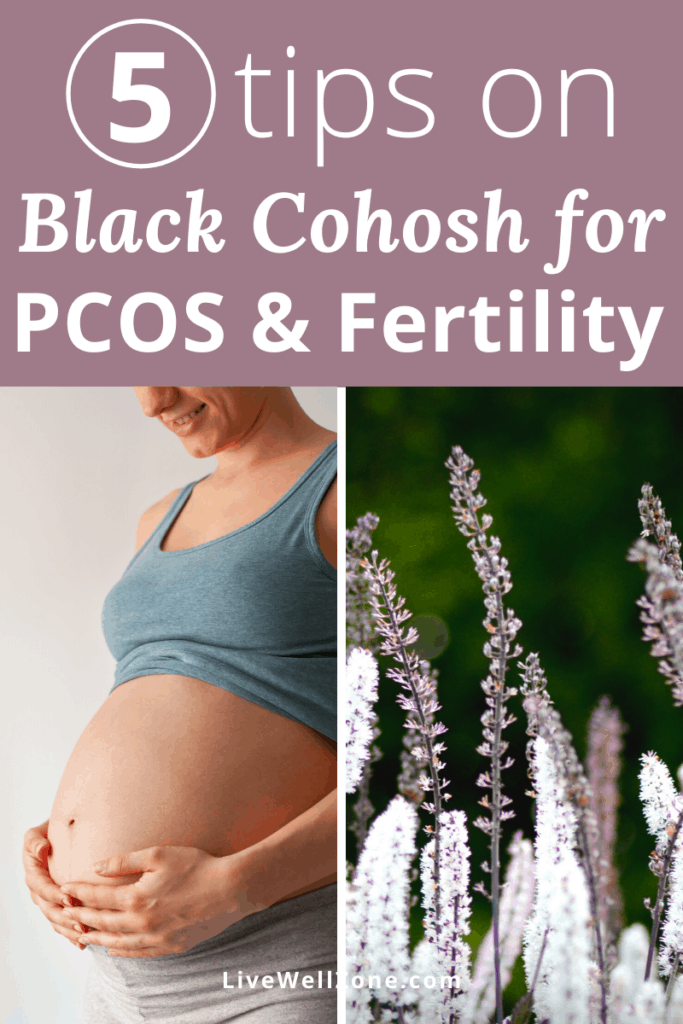
Fact: there’s some promising research suggesting that black cohosh regulates hormones and support ovulation in women with PCOS.
Another fact: finding reliable information on the use of black cohosh for pcos usually means digging through not-so-fun research papers.
So, I’ve done some investigating for you and compiled the 5 main things that you should know about black cohosh and PCOS. In this article you will learn about:
- the key benefits of black cohosh.
- how black cohosh works.
- the dosage that experts suggest and how long to use it for.
- side effects and safety precautions to be aware of.
By the end of this post you will have a better understanding of the role that this Native American herb could play in improving PCOS symptoms.
Let’s go!
Note: this post contains some affiliate links and I earn a commission (at no additional cost to you) if you use them to make a purchase.
BLACK COHOSH BENEFITS FOR PCOS
According to this 2013 study black cohosh is an effective natural remedy for stimulating ovulation in women with PCOS.
In fact, that study concludes that black cohosh can be used as a natural alternative to the prescription drug clomid (clomiphene citrate).
Furthermore, when comparing women who took black cohosh vs. women who took clomid, the study found that black cohosh:
- increases progesterone.
- thicker endometrium.
- lower LH (luteinizing hormone) levels and FSH/LH ratio (follicle stimulating hormone to luteinizing hormone ratio).
In addition, black cohosh has insulin-regulating properties and anti-inflammatory properties, that can help a lot with PCOS symptoms.
To understand how all of the above helps with ovulation and fertility, let’s break down each benefit.
1. Increases Progesterone Levels
Some women with PCOS tend to have higher levels of LH (luteinizing hormone).
And when LH is high, that triggers the body to produce more androgens and more estrogen.
Unfortunately, the combination of elevated androgen and elevated estrogen ends up interfering with ovulation (source).
Interestingly enough, one way of counteracting this imbalance is to increase progesterone…which black cohosh happens to do quite well!
So, as progesterone levels rise, this eventually helps to restore hormonal balance and support a healthy monthly cycle.
2. Thickens The Endometrium
If you’re trying to conceive, then ovulation is just one of the many steps necessary for pregnancy to occur.
Another important step is implantation, which occurs when the fertilized egg attaches to the uterine lining (aka endometrium).
However, in order for implantation to occur you need an endometrium that is sufficiently thick and healthy.
Given that black cohosh shows the ability to thicken the endometrium, it’s a natural remedy that can help you when trying to conceive with PCOS.
3. Lowers LH and FSH/LH ratio
A healthy balance of FSH (follicle stimulating hormone) and LH is necessary for the follicle and egg to develop.
Now, normally, the FSH to LH ratio is 1:1. However, for many women with PCOS, that ratio can be 2:1 or 3:1 (source).
In addition, the normal range of LH is 4 – 8. However, if you have PCOS, then your LH might be in the range of 10-20.
This elevated LH is problematic because, as I mentioned earlier, this stimulates the release of more androgens and progesterone.
And that ultimately disrupts ovulation.
So, using black cohosh is a natural way to support all of these hormones and help them shift into harmony.
4. Regulates Insulin Levels
An animal study from 2014 showed that black cohosh helps to:
- improve insulin sensitivity.
- lower blood sugar levels.
- reduce weight.
Now, even though this study was done with diabetic mice, it’s promising for anyone with PCOS because insulin resistance is a major underlying cause of PCOS.
Furthermore, the fact that black cohosh has insulin-regulating abilities is probably one reason why this herb has produced such positive results in human studies!
5. Eases PMS and Menstrual Cramps
Historically, black cohosh has been used as a natural remedy for menstrual cramps, headaches, anxiety and other PMS symptoms.
Since all of these symptoms can get worse with PCOS, adding black cohosh to your self care kit can help to make your cycles more enjoyable.
HOW DOES BLACK COHOSH WORK ON PCOS AND HORMONES?
Even though there’s anecdotal and scientific evidence about what black cohosh can do, there’s less understanding of how it actually works.
At this point in time, the scientific community believes that black cohosh acts on the nervous system.
More specifically, it’s said that black cohosh might have an estrogenic effect on the nervous system.
Now, before you panic, please know that this estrogenic effect is a good thing! It’s actually part of how the body naturally operates.
- You see, the nervous system coordinates various processes, including our menstrual cycle.
- As estrogen levels fluctuate naturally throughout the month, different parts of the nervous system (specifically, the hypothalamus and pituitary), also adjust the release of various hormones in response to what is happening to estrogen.
It’s all a beautiful symphony!
But sometimes, that symphony needs a little help so that they play the same tune.
And it seems that black cohosh is able to act on the pituitary gland (which releases LH) and help your body self-regulate again.
Now, even though black cohosh may have estrogenic properties, it’s not entirely clear if it actually contains plant estrogens.
Yes, as old as this plant is, it’s still a mystery to modern science!
But one thing that isn’t a mystery is the results it can produce.
In fact, despite being a mystery, countries like Germany, have approved the use of black cohosh as a natural form of hormone replacement therapy.
This highlights the fact that this plant provides benefits that are simply hard to ignore.
BLACK COHOSH DOSAGE FOR PCOS AND FERTILITY
Okay, now that you have an overview of what black cohosh has to offer, you might be wondering how to use it.
Well, let’s have a look.
How much black cohosh should I take for fertility?
Based on a study done with PCOS patients, 20 – 40 mg of black cohosh per day was helpful for fertility.
However, it’s ultimately best to talk to your doctor about the dosage that makes sense for you. Here’s why:
- While researching this article, I found conflicting versions of the black cohosh study cited above. One version stated that the women took 20mg, twice a day (total of 40mg per day). Another source didn’t state whether it was once or twice a day. So it could have been anywhere from 20 to 40mg per day.
- The only other reliable information I’ve found about black cohosh dosage comes from Dr. Aviva Romm. She recommends dosages of 20mg of more depending on the symptom that is being treated (1, 2). So, given that there’s some variance, it’s best to talk to your doctor about what makes sense for you.
As for which form to take, black cohosh is available in capsules or tincture.
When should I take black cohosh for fertility?
Your healthcare provider can help you figure out which phase of your cycle is best for black cohosh intake. Like all herbs, having a plan that is tailored to you will give you the best outcome.
As far which time of day to take black cohosh, if you’re using this particular brand, they suggest taking it between meals.

HOW LONG DOES IT TAKE FOR BLACK COHOSH TO START WORKING FOR PCOS?
It’s a good idea to use black cohosh for about 2 months before expecting any major improvements.
Also, be aware that most experts recommend using this herb for no more than 6 months.
This is because most (but not all) of the studies done on black cohosh lasted for 6 months. There’s not sufficient data showing that it can be used safely for longer periods of time.
Also, keep in mind that like all herbs, the results you get from black cohosh depend greatly on your diet and lifestyle.
So, whether you use black cohosh or some other supplement, pay attention to the quality of your diet. If you need help with this aspect of things, you can follow this guide on how to beat PCOS symptoms naturally, as well as this one on what to include in your fertility diet to improve egg quality.
SIDE EFFECTS & SAFETY TIPS WHEN USING BLACK COHOSH ROOT FOR POLYCYSTIC OVARY SYNDROME
As long as you buy black cohosh from a reliable company and you follow the dosage guidelines, you shouldn’t experience any serious side effects.
But having said that, there are some reports that black cohosh can contribute to liver problems. However, my research on this was inconclusive because some articles pointed out that the liver problems could have been due to:
- taking a high dose of the herb.
- poor quality herb that contained toxins.
So, to be safe avoid using black cohosh if you or your family have a history of liver issues.
Lastly, if you’re allergic to plants in the buttercup family, then stay away from black cohosh since it’s in the same family.
RELATED QUESTIONS
How can I boost my ovulation naturally?
The best and most important way to boost ovulation is to follow a fertility diet that is rich in anti-inflammatory, nutrient-dense and unprocessed foods.
What supplements should I take for PCOS?
A complete, daily supplement that has all the essential vitamins, minerals, fatty acids and amino acids is the most important place to start.
This ensures that you cover any nutrient deficiencies that could be contributing to the inflammation and hormonal imbalances that come with PCOS.
You can learn more about the daily supplement (and other supplements) that I recommend in this post on supplements for female hormonal imbalance.
CONCLUSION
Black cohosh root is just one of the many herbs that might help with PCOS and fertility.
If you’d like to learn about other herbs that you can use for natural ovulation, read this post on natural alternatives to clomid.
And for more tips on foods, drinks and other natural remedies for PCOS, be sure to check out the list of related posts below.
Related Posts:
Vitex vs Inositol: Benefits | Differences | Which is Better for PCOS and More
Maca Fertility Smoothie: Benefits, Best Type To Use and Recipe Tips
Vitex Vs. Clomid for Pregnancy: Pros & Cons, Success Rates, Side Effects and More
How to Make a Fertility Smoothie For PCOS: A Simple Guide With Recipes
Adaptogens For PCOS: Why You Need Them and Which Ones To Use
A Complete Guide to Using Cinnamon for PCOS: For Acne, Weight Loss, Menstrual Cycle and More!
Additional References:
https://pubmed.ncbi.nlm.nih.gov/25022210/
https://ods.od.nih.gov/factsheets/BlackCohosh-HealthProfessional/
https://pubmed.ncbi.nlm.nih.gov/14514351/
http://cms.herbalgram.org/herbclip/479/041352-479.html
https://draxe.com/nutrition/black-cohosh/
https://link.springer.com/article/10.1186/s40816-015-0013-0
https://www.nccih.nih.gov/health/black-cohosh
http://cms.herbalgram.org/press/files/black_cohosh_20020729.pdf

